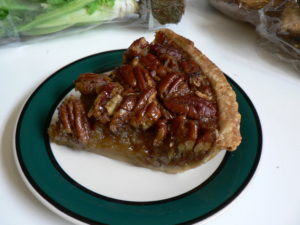
The pecan pie is the official Texas state pie (Creative Commons license attribution: photo courtesy Stuart Spivack)
Memorial Day weekend is coming up, and with family gatherings being planned, it’s a good idea to start thinking about what dishes to prepare and bring to the event.
Fortunately, the official Texas state tree, the pecan tree, provides a nut that is at the heart of many different recipes—and is heart-healthy.
1. The pecan didn’t get its name from Texans.
According to a recent article in Traditional Home magazine, pecans get their name came from the Algonquin, a Native American people who lived what is now Canada and the Upper Midwest of the United States.
Loosely translated, “pecan” means “tough nut to crack.”
2. Texas doesn’t always come in first when it comes to pecan production.
According to the association, Georgia is the leading producer of pecans in the United States. Texas is usually second. The average crop in Texas is 60 million pounds.
3. Pecans are good for your health.
The pecan is not only the official Texas state tree and the state pie, but it is also the state health nut.
According to the Texas Pecan Growers Association, a nonprofit organization founded in 1921 and headquartered in Bryan, pecans are not only cholesterol-free, they can double the cholesterol-lowering effectiveness of a heart-healthy diet.
4. “Pecan” is pronounced differently across Texas, and the country.
When it comes to how to correctly pronounce “pecan,” it depends on where you’re from. For example, the television chef Paula Deen, from Georgia, has pronounced it pee-CAN.
A map, produced by North Carolina State University and published on an agricultural web site, provides a map showing how people across America pronounce the word.
According to this map, there are four versions:
- Pee-KHAN
- Pick-ANN
- PEE-can
- PEE-kahn
5. Texas will soon celebrate its 100th anniversary of the adoption of the pecan as the state tree.
Texas adopted the pecan as the state tree in 1919. The movement for this was inspired by Governor James Stephen Hogg (1851-1906), the state’s first native-born governor and father of philanthropist Ima Hogg (1882-1975). Before his death, Hogg said he wanted a pecan tree planted at his gravesite instead of a traditional gravestone.
